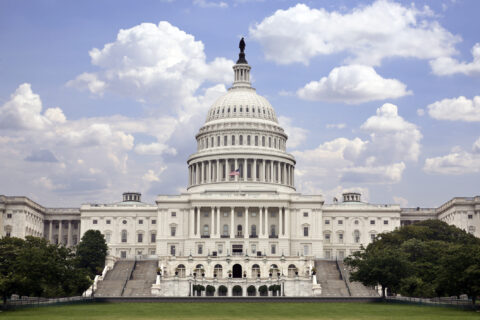The White House and the Congressional Majority have used the first 100 days of the New Administration to advance the Trump/Vance agenda on federal spending. Four major proposals aimed at federal tax policies and spending programs could result in significant change to the federal-local partnership and other shared responsibilities that currently exist between federal, state and local governments. Taken together, the four legislative efforts: Budget Reconciliation, the new Tax Bill, a Spending Recissions bill and Appropriations for FY2026 offer a new vision for partnerships that could reduce regulatory costs for local governments, but at the expense of direct federal funding for local priorities.
In a letter to Congress accompanying the President’s FY2026 Budget Proposal, OMB Director Russell Vought revealed that many of changes being sought stem from a “rigorous, line-by-line review of FY 2025 spending, which was found to be laden with spending contrary to the needs of ordinary working Americans and tilted toward funding niche non-governmental organizations and institutions of higher education committed to radical gender and climate ideologies antithetical to the American way of life”.
On local governments specifically, the letter states, “We also considered, for each program, whether the governmental service provided could be provided better by State or local governments (if provided at all). Just as the Federal Government has intruded on matters best left to American families, it has intruded on matters best left to the levels of government closest to the people, who understand and respect the needs and desires of their communities far better than the Federal Government ever could.”
Budget Reconciliation
Budget reconciliation is a process used by Congress to make legislation easier to pass in the Senate. This is a political vehicle that only requires a simple majority, rather than 60 votes, to pass in the Senate. In March, Congress passed a Continuing Resolution that eliminated the possibility for a government shutdown until October 1. While most annual grant programs that support local government with direct funding continue to receive the same funding levels approved in FY24, it still cut $13 billion in domestic spending from the previous fiscal year. House committees are in the process of marking up the FY25 Budget Reconciliation Bill and offset decisions they make during this process will help clear the way to meet the needs of other upcoming packages outlined below.
NLC sent a request to Congress (PDF) to consider municipal government perspectives on reconciliation directives within the FY25 Budget and the ensuring extension of the Tax Cuts and Jobs Act of 2017. As Congress continues to debate the priorities during committee markup, potentially delaying their own deadline to bring this to a floor vote in both chambers by the end of May, local leaders should review the letter and share the impact of these priorities on municipal operations with their Congressional delegation.
Tax Bill
The Tax bill is a portion of the one large fiscal package (which incorporates Budget Reconciliation) that includes tax cuts and new funding for border security, among other priorities. Any changes to federal tax and spending directly targeting local government revenue or financing mechanisms have an outsized impact on the overall fiscal capacity of municipal governments. As the House considers this portion of the bill and offsets that will be necessary to achieve them, local leaders should review the potential expenditures that may be considered in our letter, including ways to incentivize housing supply, flexibility for water infrastructure and municipal financing mechanisms like SALT and municipal bonds and be prepared to educate their Congressional delegation on the impact of these priorities on municipal operations.
Recissions Package
The Recissions package is a Congressional effort to codify the federal funding freeze that the Administration imposed through a series of Executive Orders which are currently in enforcement limbo and facing legal actions. Congressional Republicans have been waiting for a formal package from both the President and administration officials which they expect will cancel $9.3 billion already approved funds, mostly related to foreign aid initiative and public broadcasting. While the scope of programs to permanently claw back is narrower from Congress, the final package that the White House is expected to deliver may be much wider and include grants that impact nutrition programs and grants authorized by the Infrastructure Investment and Jobs Act (IIJA) and Inflation Reduction Act (IRA). This has the potential to permanently disrupt municipal projects that are in motion. The package is also expected to be met with hurdles as Congressional officials across both parties do not support cutting funding for all the programs that may be targeted in the package the Administration provides. NLC will continue to monitor the details of the package when released and mobilize local officials to take action if there is an immediate threat to key programs.
President’s Blueprint for FY26
On May 2, the White House Office of Management and Budget released the President’s FY26 Skinny Budget which asks Congress to cut $163B in non-defense spending. The proposed cuts impact specific programs critical to improving infrastructure in American cities, specifically housing and climate resilience related grants. The proposal cuts $26.7 billion in state rental assistance block grants, part of what the administration calls for a push for states to create their own rental programs and build more affordable housing. The proposal also cancels more than $15 billion in IIJA funds earmarked for renewable energy and carbon dioxide removal programs. This budget blueprint is expected to face significant pushback ahead of the September 30 deadline as top Congressional Republican and Democrat officials have already expressed concerns.
NLC continues to closely monitor and engage with Congress on the details that emerge from negotiations across all the legislative vehicles addressed above. NLC will continue to identify and advocate for direct funding programs to local governments that will be impacted.
Federal Budget Tracker
Stay updated on proposed funding levels for programs impacting local governments through our Federal Budget Tracker.










